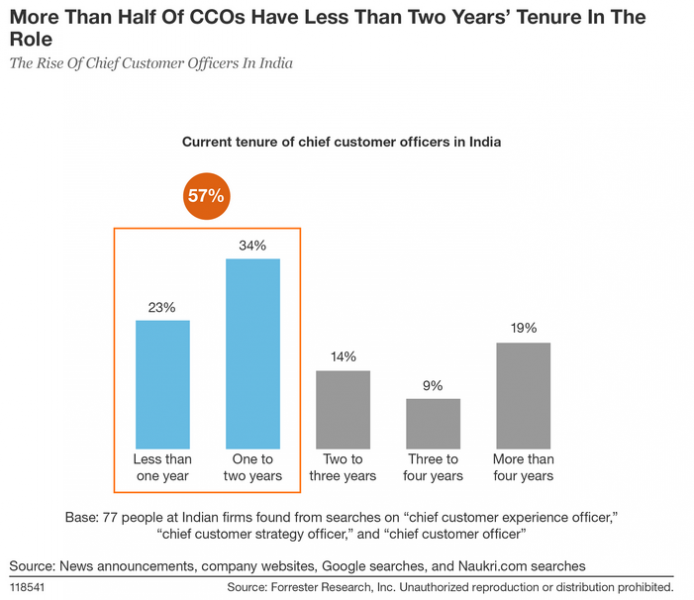Opportunities For Success For New Chief Customer Officers In India
While most Indian organizations focus on driving customer experience (CX) excellence, the chief customer officer (CCO) role is still nascent. For my recently published report chronicling the rise of the CCO in India, I studied 79 public profiles of CX leaders across organizations doing business in India to better understand their job title, their tenure as a CCO, and their background and experience. My research revealed that the CCO is a role newly added to most of these professionals’ résumés: Almost all are first-time CCOs and majority have been in the CCO role for less than two years (see figure below). I also found that nearly all (99%) organizations have only recently added this business role to their cluster of C-level executives; the CCO role has existed, on average, for 2.7 years.

Even though the CCO’s job is held by experienced individuals with an average of 16 years of work experience and extensive leadership background across varied business disciplines, their past experience has limited relevance to their current CX position. New CCOs are bound to face challenges that are common to weakly established business functions; abilities acquired and lessons learned in prior roles will have limited relevance to the CCO role. This will be amplified by the lack of structured processes at their organization and the inertia they will face in trying to break down existing process and operational silos across the CX ecosystem. However, it’s not all bad. By looking beyond the obstacles, there is upside for both CCOs and their organizations in this seemingly challenging situation. They will gain:
- Deep learning by building the CX foundation. There’s no greater source of learning than doing something yourself. Constructing key CX processes from ground up gives CCOs and their organizations the chance to deepen their understanding of key elements of the CX discipline and better synchronize efforts across the organization to work toward a common CX goal.
- An opportunity to explore new and innovative ways to drive transformational changes. In the absence of structured CX processes and protocols underlining business operations, the resistance to change is expected to be lower while experimenting with newer ways to operate that better aligns the business with CX goals. In addition, CCOs with limited past CX experience are bound to have a more open thought process, as they are not restricted by existing knowledge and beliefs. This scenario provides an opportunity to drive critical changes that defines CX success.
Forward-looking CCOs should not get bogged down by short-term challenges of the job. Instead, focus on turning the situation in your favor by looking at opportunities to build your CX understanding and define strategic process changes that will help ensure your long-term success.